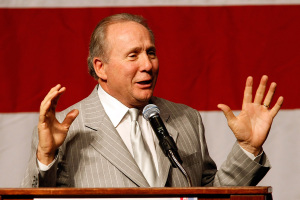'Fatherless' Q&A With Authors Dr. James Dobson and Kurt Bruner
The recipe for a future societal collapse has been set, according to Dr. James Dobson, author of Fatherless.
Research suggests that by 2050, the elderly population in the United States will more than double, while at the same time the proportion of those in younger demographics will significantly shrink. Combine that with the fact that just over half of all adults in America are currently married and the rate of children being born to single parents has never been higher.
Dr. Dobson, founder of Focus on the Family, recently published his first fiction novel with the help of co-author Kurt Bruner. The pair attempted to draw attention to a very possible future if the current social trajectory and demographic trends hold true.
"Fatherless" takes a current snapshot of present day and furthers that picture ahead 40 years to portray what could end up being a world we live in where society is divided into two factions: those who live a selfish life and those who attempt to maintain a divinely inspired sense of self and family.
The Christian Post had the opportunity to interview both Dr. Dobson and Kurt Bruner to find their motivation in completing this work and what sets this novel apart.
The Christian Post: What pushed you to write your first fiction novel?
Dr. Dobson: This is my first attempt to write it and I've really enjoyed the process. Sometimes a compelling story can shape the imagination better than non-fiction. Abraham Lincoln said a novel called Uncle Tom's Cabin started the Civil War. We hope these stories will inspire and motivate readers to celebrate the resilient beauty of God's design for the home.
The Christian Post: What do you hope people will take away from this work?
Bruner: First, we hope they enjoy a gripping story they can't put down. So far, that's what readers are saying. Second, we hope they come away from the experience more passionate about the priority and beauty of the home.
CP: Why was this topic chosen as opposed to other pressing matters related to society and the family?
Dr. Dobson: Because the looming demographic crisis is directly related to all of the other issues affecting families. We chose to set our stories three decades hence to depict how the choices and trends of today will impact the not-too-distant future.
CP: The book paints a pretty bleak picture of the future. Is this really where we are headed?
Dr. Dobson: These novels don't predict the future, they simply project the trajectory of current demographic trends. The story is set in the year 2042 when the economic pyramid flips, too few young bearing the burden of a rapidly aging population. These trends are already creating headlines.
Japan, for example, has the oldest average citizen on the planet. Last year they sold more adult diapers than baby diapers ... A few weeks ago the finance minister of the newly elected government said the elderly need to "hurry up and die" because they can't sustain the social safety net.
Where we are headed? The best demographers tell us it is inevitable since we can't go back in time and make more children.
CP: You've been an advocate for families for decades. What is the state of the family today in America? What are the biggest threats to families?
Dr. Dobson: The biggest single threat to our future is the trend away from forming families to begin with. Marriage is in drastic decline. For the first time in history more women are single than married. Raising children is now considered an inconvenient burden rather than life's highest calling.
For the first time in our history there are fewer households with children than without. The most basic human instinct, forming families, is in dramatic decline. And the implications of that reality ... is breathtaking. That's why we chose the looming demographic crisis as the backdrop to these stories.
CP: What needs to change so that we don't find ourselves in the future depicted in "Fatherless?"
Dr. Dobson: We need to remind ourselves that marriage and parenthood are honorable pursuits and that the natural family retains a resilient beauty and importance nothing can replace. We need to support those willing to make the sacrifices required to raise up a new generation of kids rather than making it more difficult for them to do so.
We need to thank women who choose to bear and nurture children and honor men who model the heroic self-sacrifice of loving fatherhood ... the family is vital to the health and stability of the future. In short, we need to move from a fatherless world to a world filled with "bright spots" called mom, dad, sister, brother, grandma and grandpa!
CP: What conviction led you to launch this series?
Bruner: A happy home is the highest expression of God's image on earth. Marriage and parenthood echo heaven, something hell can't abide. In 1977, Dr. Dobson founded what became a worldwide ministry dedicated to the preservation of the home. I joined his team in 1985. That effort placed us in one cultural skirmish after another, unwittingly confronting forces much darker than we knew.
We don't pretend to comprehend what occurs in the unseen realm. But we know that we all live in what C.S. Lewis called "enemy-occupied territory." The scriptures tell us Satan will "go out and deceive the nations" at the end of history. A central focus of that deception will be, we believe, the final stage of an assault that began when Lucifer decided to spoil or destroy God's image on earth as seen in marriage and parenthood.
CP: You've set the story in 2042. Why that year?
Bruner: In roughly thirty years, America will join the rest of the developed world in the economic and cultural fallout of a rapidly aging population. Our economic pyramid will flip when the old and feeble outnumber the young and productive. Recent declines in marriage and parenthood are fueling the most dramatic reduction in fertility in human history.
We are already seeing the impact in places like Europe, Japan and Russia. Social and financial collapses invariably accompany depopulation. This series depicts tomorrow's conflicts rooted in today's demographic realities.
CP: If you had to describe "Fatherless" in two or three words, what would you say?
Bruner: Prophetic. Disturbing. Beautiful.



























